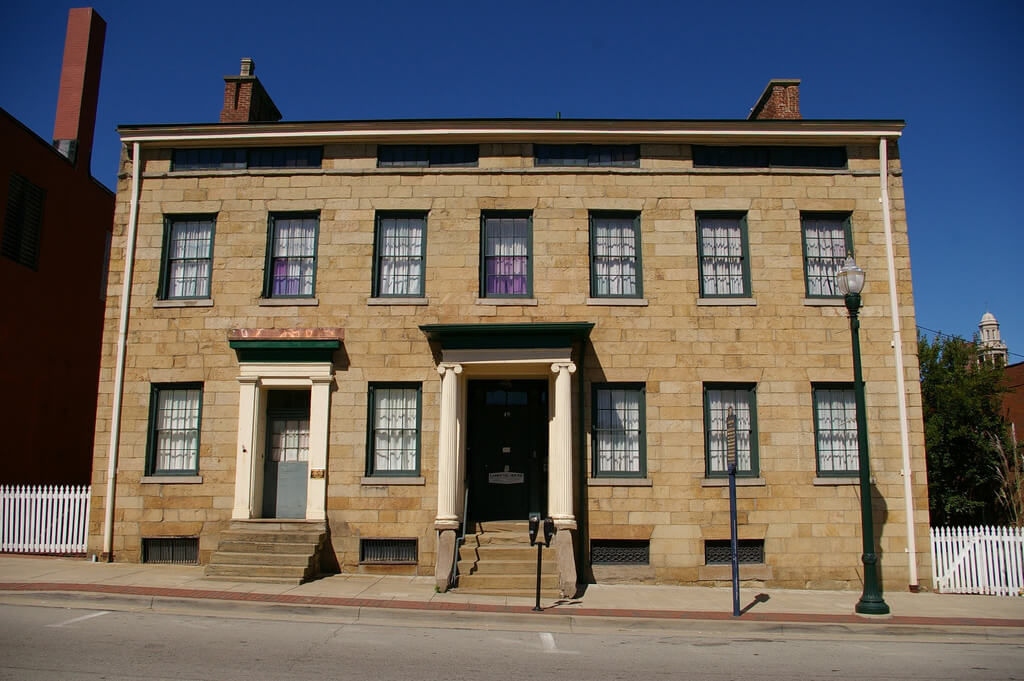The stately stone house, located at 49 East Maiden Street in downtown Washington, PA, was built in 1812 by John Julius LeMoyne, the father of Francis Julius LeMoyne. Both father and son were practicing physicians, but it was the courageous Francis Julius LeMoyne who, despite the strict Fugitive Slave Law of 1850, risked his personal freedom and fortune to do what he knew was morally right — take a stand against the institution of slavery. This successful 19th Century doctor, reformer and builder of the first crematory in the western hemisphere, opened his home and properties as stops along the Underground Railroad, the series of safe hiding places for runaway slaves as they trudged north on their precarious journey to Canada and freedom.
LeMoyne House
The LeMoyne House
Discover the Underground Railroad at The LeMoyne House



Dr. Francis Julius LeMoyne
Dr. Francis Julius LeMoyne: Advocate for Education and Social Justice
Dr. Francis LeMoyne is known for his significant contributions to history as an advocate for cremation and as a fierce abolitionist. During a time when cremation was considered unusual and even morally objectionable, LeMoyne stood as a prominent advocate for the practice. He challenged societal norms and beliefs surrounding burial traditions.
LeMoyne's advocacy for the abolition of slavery was equally noteworthy. In an era when slavery deeply divided states and communities, often leading to violence, LeMoyne fearlessly expressed his belief that owning other human beings and exploiting them for labor was morally abhorrent and unjust.
Born in 1798 in Washington, PA, LeMoyne was the son of John Julius LeMoyne, a farmer, and Nancy McCally LeMoyne, a teacher. He attended what is now known as Washington & Jefferson College and later became a doctor in Washington. According to a retrospective article in the Pennsylvania Heritage Magazine by Todd Mealy, LeMoyne spent two decades practicing medicine as a frontier physician. He provided medical care and performed surgeries across vast territories, enduring challenging conditions, including harsh weather, and lacking anesthesia or skilled assistants. Additionally, LeMoyne fathered eight children during this time.
Francis LeMoyne's legacy includes his pioneering efforts in advocating for cremation and his unwavering dedication to the abolition of slavery. His contributions exemplify his commitment to challenging societal norms and fighting for justice and equality.
Explore Washington County's History
Ready to visit this national landmark and learn more about Dr. LeMoyne's story?
Rich History
WCHS’s LeMoyne House represents an important part of Southwestern Pennsylvania’s rich history. The
National Park Service states that the LeMoyne House is one of six NPS-recognized Underground Railroad sites in Pennsylvania – it is the only one of these six located west of the Allegheny Mountains.
Underground Railroad
The significance of the property was further highlighted in a February 2017 article in the
New York Times, entitled “Pittsburgh’s Underground Railroad, Preserved and Not,” which cited the LeMoyne House as one of the few Underground Railroad sites in Southwestern PA still in existence.
The LeMoyne House Today
Today, the LeMoyne House is owned and administered by WCHS as a museum open to the public.
The LeMoyne House more than just a historical stone structure and a history lesson – it is a ‘theater’ in which the struggles and triumphs of social reformers and activists of the past can be depicted, and a contextual lens through which modern concepts of social justice and community inclusivity can be considered.

Request a Tour
Step Back in Time
* Tour dates are subject to demand and availability. We strive to accommodate all interested participants and will do our best to arrange tours on preferred dates whenever possible.


